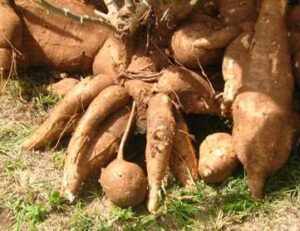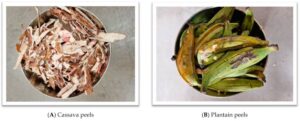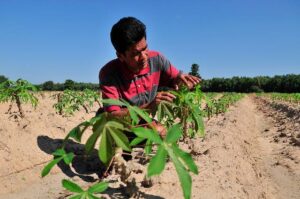Back to: Botany 400 Level
How far, my sharp Afrilearn scholar? I hope say your brain still dey work like generator wey no dey stop! Today, we go focus on something wey we sabi well well for Nigeria — cassava, banana, and yam propagation. These crops na backbone of our agriculture, and through the power of tissue culture and modern propagation methods, we dey help farmers produce better yields, disease-free crops, and healthier plants. No more waiting for long planting seasons or battling with disease-infested tubers. Let’s break down how these crops dey benefit from plant biotechnology.
Case studies in cassava, banana, and yam propagation
You know say cassava, yam, and banana no dey just grow by themselves o! Dem need attention, especially when we dey talk about improving quality, yield, and resistance to disease. In many parts of Nigeria, cassava be staple food, yam na celebratory dish for parties, and banana dey everywhere, from markets to backyard gardens. By using modern propagation techniques, we fit grow these crops better, faster, and with fewer losses.

Cassava Propagation
Cassava is one of Nigeria’s most important food crops, and with the rise of tissue culture, we don improve how we propagate it. Normally, cassava is propagated through cuttings, but sometimes these cuttings bring diseases like cassava mosaic virus (CMV) or cassava brown streak disease (CBSD), which can affect growth and yield.
How Tissue Culture Helps:
- Disease-free Plantlets: With tissue culture, we can take a healthy cassava tissue (like a shoot or stem) and grow it in a sterile lab environment. This ensures that the plantlets produced are free from viruses and other pathogens.
- Fast Multiplication: Tissue culture allows scientists to produce thousands of healthy cassava plants from just one healthy cutting in a short period of time.
- Improved Varieties: Nigerian scientists use tissue culture to propagate high-yielding and disease-resistant cassava varieties that produce better tubers and are resistant to common diseases.
Banana Propagation
Bananas are very popular in Nigeria, both as food and for commercial purposes. Traditionally, bananas are propagated by suckers, but this method can introduce diseases like banana bunchy top virus (BBTV), which negatively impacts yield.

How Tissue Culture Helps:
- Production of Disease-Free Plantlets: Just like with cassava, banana propagation through tissue culture ensures that the plantlets are free from diseases like BBTV. This is important, especially in regions where banana farming is vital for income.
- Mass Production: From a single banana plant, thousands of healthy banana plantlets can be produced. This makes it easier to meet the high demand for banana planting materials, especially in commercial farms.
- Uniformity and Faster Growth: Tissue-cultured bananas grow more uniformly, with fewer risks of stunted growth or disease. This helps farmers achieve higher yields over shorter periods.
Yam Propagation
Yam is a crop we love dearly, and no celebration or event is complete without a yam dish! However, yam propagation has been challenging due to the slow growth of yam tubers and the fact that they can carry diseases when propagated through traditional methods.
How Tissue Culture Helps:
- Clean, Disease-Free Seed Yam: With tissue culture, scientists can grow clean yam plantlets, avoiding diseases like yam anthracnose and other fungal infections that can reduce yield.

- Faster Multiplication: By using micropropagation, farmers can get more planting material in less time. This helps ensure that they have a steady supply of healthy yams for planting and selling.
- Uniform Yams: Since tissue culture produces identical plantlets, farmers get yams that mature at the same time, making harvesting and selling more efficient.
In Nigeria, organisations like the International Institute of Tropical Agriculture (IITA) have been working to improve yam, cassava, and banana through modern propagation techniques. For example, the IITA’s research on cassava tissue culture has led to the mass production of disease-free cassava plantlets, which are now being distributed to farmers across the country. This has led to increased cassava yield and has improved the livelihoods of smallholder farmers who rely on cassava as a main source of income.
In addition, Nigerian farmers in the Middle Belt now have access to improved banana varieties that are resistant to BBTV, helping to secure banana production for local markets and export. Yams from tissue culture are also growing at faster rates, improving food security in yam-growing regions.
Summary
- Cassava, banana, and yam are key crops for Nigeria, and tissue culture provides an effective way to propagate these plants faster, disease-free, and in large quantities.
- Tissue culture ensures disease-free plantlets, higher yields, and faster growth, which are critical for improving food security and farmers’ incomes.
- By producing identical plants with uniform growth, farmers get consistent results and can plan their harvests better.
Evaluation
- What are the main advantages of tissue culture in cassava propagation?
- How does tissue culture benefit banana farmers?
- Why is tissue culture important for yam propagation?
- Can you name one Nigerian research institution that works on improving crops like cassava, banana, and yam?
See as you don grasp these real-life applications wey dey affect agriculture in Nigeria. The future of farming in Africa dey depend on scholars like you wey get knowledge and passion for agriculture. Keep that energy high! Afrilearn dey with you, ready to help you take on any topic. On to the next lesson — we go keep moving forward!
